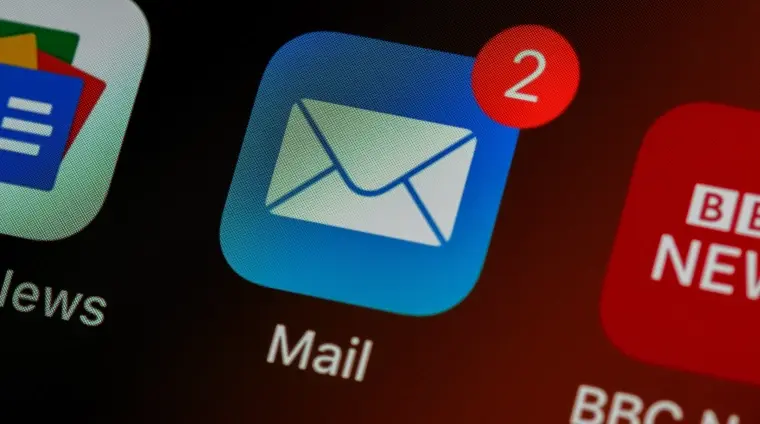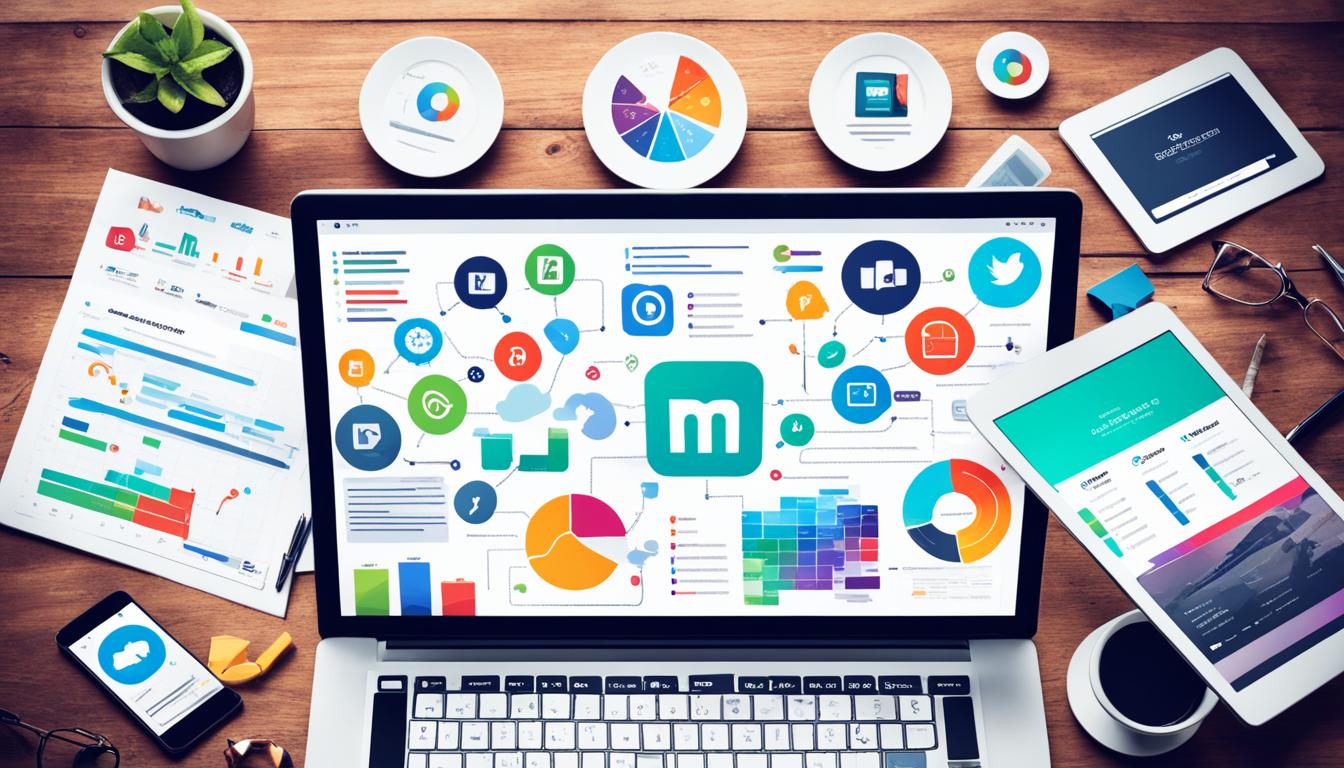Today’s world moves quickly, with new ways to reach people popping up all the time. This is where digital marketing shines. It covers a wide range of ways to spread the word about products and services online. Businesses use everything from websites to social media, email, and more to connect with customers.
It’s important to know what makes up the digital marketing world to truly understand it. Key parts include Search Engine Optimization (SEO), making great content, social media, email outreach, and more. All these help businesses achieve global reach, without breaking the bank. Plus, they allow for focused marketing, measurable success, and quick adjustments.
Key Takeaways
- Digital marketing envelops various strategies, like SEO, content marketing, and more, to connect businesses with customers.
- Besides making connections, it offers global market access, cost savings, focused targeting, and flexible strategies.
- Knowing the digital marketing world well is key for businesses to connect effectively with their audiences.
- Digital marketers handle many tasks, from forming strategies to tracking results, to ensure the success of these efforts.
- To stay competitive, companies need to keep up with the latest in digital marketing trends and tools.
The Evolution of Digital Marketing
Businesses are focusing more on digital marketing these days. This is because the world is more connected through digital means. The internet and digital devices have changed how companies talk to their customers. Traditional marketing is fading away as digital marketing becomes the norm. This change lets businesses connect with their audiences better and for less money.
The Rise of Online Advertising
Online advertising is becoming more important. It allows businesses to aim at certain groups and see instant results. The digital ad industry is now worth about $200 billion. This lets companies use tools like Google AdWords to find customers easily and affordably. Google AdWords makes up 96% of Google’s income.
Reaching Global Audiences
Digital marketing helps companies talk to people all over the world. With about 3.1 billion people online, it’s easier to connect with a variety of customers. This breaks down old barriers and creates new chances for growth. More consumers are accessing digital content, making it a powerful way for businesses to reach out.
The Digital Marketing Ecosystem
The digital marketing ecosystem is a bunch of different parts that work together. They make up a full marketing plan. These parts have many strategies and tactics. They help businesses connect with their target customers in useful ways.
Search Engine Optimization (SEO)
SEO is about making websites show up more in search results. Businesses can jump up in search rankings by doing this. Then, more people can find them when they’re looking online. This brings in more potential customers.
Content Marketing
Content Marketing is all about sharing helpful information with people. This makes businesses look like experts and builds trust. Creating useful and interesting content keeps customers coming back for more.
Social Media Marketing
Social Media Marketing uses sites like Facebook or Twitter to talk to customers. By being active on social media, businesses spread the word about themselves. It also helps them connect with customers, making their marketing more powerful.
Email Marketing
Email Marketing means sending interesting emails to people who’ve signed up. This direct line to customers is great for selling more and building loyal customers. Sending targeted messages makes people more likely to buy.
Pay-Per-Click (PPC) Advertising
PPC Advertising is about paying to have your ads seen. Businesses can pick who sees their ads, making it very targeted. They can also see right away if these ads are working, which is great for their budget.
Affiliate Marketing
In Affiliate Marketing, businesses work with affiliates who help sell their stuff. This is a team effort to bring in more customers and sales. It expands a company’s reach in ways they couldn’t do alone.
Influencer Marketing
Influencer Marketing uses popular people online to talk about a product. This can reach new people and make a brand more well-known. It’s a great way to show off products that feel real and authentic.
Analytics and Data Analysis
Analytics and Data Analysis let businesses see how well their marketing is doing. They can then make smarter choices based on this info. By always looking at what works, they keep getting better at marketing.
The Role of a Digital Marketer
The role of a digital marketer is very broad. It covers many different jobs. These include making digital marketing plans that meet business goals and appeal to the target audience.
Strategy Development
This part is about creating detailed digital marketing plans. These plans should match what the business wants and what the customer likes.
Campaign Management
It’s about running and improving digital marketing projects. This includes checking how well things are going, changing methods if needed, and making sure everything runs smoothly.
Content Creation
Creating content is key in digital marketing. Marketers have to make content that’s interesting, useful, and looks good on different platforms.
Social Media Engagement
Engaging on social media is crucial. Marketers must talk to people, answer their questions, and work on making them loyal to the brand through social channels.
Data Analysis and Reporting
Understanding data is essential. Marketers have to keep an eye on important numbers, figure out how well their efforts are doing, and offer advice based on what they find.
Digital Marketer Role
Digital marketers use various digital marketing methods to help businesses succeed online. They create and implement digital marketing plans that match the company’s goals. This includes knowing about different online platforms and strategies. They aim to reach and interest their target audiences.
| Key Responsibilities of a Digital Marketer | Popular Tools Used by Digital Marketers |
|---|---|
|
|
Digital marketers should have a wide range of skills, from tech savvy to being creative. They use SEO, content, and social media well. But their job is also about solving problems and coming up with new ideas. They have to keep up with tech changes, balance creativity with data, and handle data laws well.
“The digital marketing industry in India is expected to grow by 27.4% by 2025, generating at least 20 lakh jobs in the current year.”
Career paths for digital marketers can range from starting jobs to high-level positions. This change depends on their skills and the company’s needs.
Skills and Traits of a Successful Digital Marketer
To do well as a digital marketer, you need a mix of skills and qualities. You should be good at looking at data and finding meaning in it. Being creative and able to tell stories is very important too. You need to make content that people will like and notice. Also, you should be open to change and love to learn. The digital marketing world changes fast, so you need to keep up with new ideas and tech.
Analytical Mindset
Digital marketers who do great have top-notch analytical thinking. They use data to make smart choices. They’re skilled at using tools to understand what consumers like, what’s happening in the market, and how campaigns are going.
Creativity and Storytelling
For a digital marketer, being creative and knowing how to tell a story are a must. You have to come up with content that grabs people’s attention visually and through stories. This is how you make the brand’s message hit home with the target group.
Adaptability and Curiosity
The field of digital marketing is always changing. If you want to succeed, you must be ready to adapt and curious to learn new things. Keep up with trends, try new technologies, and always look for fresh strategies to stand out.
Emerging Trends in Digital Marketing
The digital marketing world is always changing. New tech and trends are shaking things up. Artificial Intelligence (AI) and Machine Learning now help marketers do more with less. They can automate tasks, make content personal, and use data in smart ways.
Voice Search Optimization
Voice search optimization is becoming key. More people are using their voice to find information or buy things. A study says 55% of teenagers voice search every day. It’s expected that, by 2022, half of online buys will come from voice searches.
Augmented and Virtual Reality
Augmented Reality (AR) and Virtual Reality (VR) open doors for new, immersive brand experiences. They help companies connect with customers like never before. These techs change how people see and feel about brands. They offer experiences that make them remember and love the brand more.
Staying on top of digital trends is crucial. Businesses need to watch these shifts and adjust their plans. Using artificial intelligence, machine learning, voice search, AR, and VR can help. Marketers can reach their audience better. They can make campaigns more personal and effective. This helps move their business in the right direction.
Measuring Success in Digital Marketing
It’s crucial to measure digital marketing success. Doing so helps make better strategies and tweak campaigns. Marketers use Key Performance Indicators (KPIs) to check how well tactics work. These include website visits, rates of turning visitors into customers, and how often ads are clicked.
They also look at the Return on Investment (ROI). This is to ensure their digital efforts bring real business results.
Key Performance Indicators (KPIs)
KPIs are key to knowing how well digital marketing is going. They help see what’s working and what needs work. Marketers pay close attention to website visitors, how many become customers, and if people interact with ads. By looking at these KPIs, they improve their strategies.
Return on Investment (ROI)
Measuring Return on Investment (ROI) in digital marketing is key. It tells us if the money spent is making the business enough money back. Understanding this helps justify budgets and spend money wisely.
Customer Engagement and Loyalty
Digital marketers also measure how much customers like and trust their brand. They look at lifetime customer value and how likely customers are to recommend them. This gives insights into how digital marketing efforts affect building strong, lasting customer relationships.
| Digital Marketing Metric | Description | Importance |
|---|---|---|
| Website Traffic | The number of visitors to a website, including unique visitors and returning visitors. | Measures the overall reach and visibility of a business’s digital presence. |
| Conversion Rate | The percentage of website visitors who complete a desired action, such as making a purchase or filling out a form. | Evaluates the effectiveness of a website or digital campaign in driving desired customer actions. |
| Click-Through Rate (CTR) | The ratio of users who click on a specific link or advertisement to the total number of users who view it. | Indicates the level of user engagement and the relevance of digital marketing content. |
| Customer Lifetime Value (CLV) | The total revenue a business can expect from a single customer throughout their relationship. | Provides insights into the long-term value and loyalty of customers acquired through digital marketing efforts. |
| Net Promoter Score (NPS) | A measure of customer loyalty and the likelihood of customers to recommend a product or service. | Helps assess the overall satisfaction and advocacy of customers, which can impact the success of digital marketing campaigns. |
Tracking these digital marketing metrics helps businesses make smarter moves. Using customer insights, they can better reach their goals and make the most of their investment.
Digital Marketing Challenges and Solutions
Digital marketing is full of benefits but has its hurdles. Data privacy and security are major worries for people today. They are more alert about how their info is handled. Ad blocking and ad fatigue are also big problems. People are getting tired of adverts that interrupt them.
To tackle these obstacles, marketers need to be on their toes. They should make their content engaging and less bothersome. Also, they should follow data privacy rules strictly. For success, they must keep learning and adapting. This is key in the digital world that changes so fast.
Data Privacy and Security
Nowadays, people are very cautious about data privacy and security online. Companies have to be open about how they use data. They need clear permission from customers and protect their information. This builds trust and keeps them in line with laws like GDPR and CCPA.
Ad Blocking and Ad Fatigue
Ad blocking software is on the rise. Plus, consumers are getting bored of ads. Marketers need to make content that’s interesting and helpful. This kind of content will connect better with people. They should also use data to make ads more personal and put them where they are welcome.
Staying Ahead of the Curve
The world of digital marketing is always changing. Marketers need to keep learning and trying new things. By staying up to date, they can meet the changing needs of their audience. They should embrace new tech like AI and pay attention to trends like voice search. This helps them stay competitive and deliver better campaigns.
Integrating Digital and Traditional Marketing
Today’s marketing world is always changing. Companies need both digital and traditional ways to reach customers. This creates a smooth experience for the customer. Using both approaches together can help companies connect better with customers. They can also make their brands stronger and meet their goals.
Omnichannel Strategies
Having strategies that mix online and offline methods is key. It lets companies talk to people in many different ways. This includes in stores and on the internet. Customers get a similar and personal feel everywhere they interact. This makes them like the company more and stay loyal.
Consistent Branding and Messaging
Keeping the same look and message everywhere is crucial. It makes the brand look strong and trustworthy. When a company’s style, voice, and message are the same, people notice. They connect with the brand better. It doesn’t matter if it’s on social media or ads, the brand feels the same.
Using both digital and traditional marketing well can be powerful. Companies can really boost their outreach and strengthen their brand. It also makes the customer’s journey with the brand smooth and enjoyable. This whole approach helps companies grow their audience, improve their brand image, and keep customers happy.

Building a Successful Digital Marketing Team
Putting together a winning digital marketing team means being smart and strategic. You need to mix collaboration with cross-functional expertise. This type of marketing is all about using different skills, like making online content, running social media, and analyzing data. When team members come together, sharing their different experiences, it boosts your digital marketing efforts.
Collaboration and Cross-Functional Expertise
Creating a top-notch digital marketing team starts with a culture of collaboration. You bring people with various skills, from making content to analyzing data, together. This mix creates a powerful team that comes up with innovative ideas and gets the best results.
Continuous Learning and Development
The field of digital marketing changes fast. So, continuous learning and development are vital to keep ahead. When companies support the growth of their digital marketing team, it keeps everyone current with the newest trends and techniques. This approach helps businesses adapt and succeed for the long haul.
Case Studies and Success Stories
Studying digital marketing case studies and success stories unlocks effective strategies. By exploring digital marketing campaigns that worked well, businesses can learn. They can see how to reach their audience and get good results.
Innovative Digital Marketing Campaigns
iSpionage saw a 58% blog traffic boost and a 5.47% Click-Through-Rate (CTR) using retargeting popups. Lawrence of Morocco’s Game of Thrones map got over 11,300 visits and was featured in big media. These examples highlight the impact of creative, data-focused digital marketing efforts.
College Raptor grew from 0 to 100,000 website visitors a month with a content strategy in a year. Fractl’s work on the Sapio dating app saw a 3,072% jump in weekly app installs in 5 weeks. Vogue India and AstraZeneca’s social campaigns got millions of views quickly. These efforts more than doubled the latter’s followers.
Lessons Learned and Best Practices
By breaking down successful digital marketing campaigns, marketers learn important lessons. Creative content, smart targeting, and focusing on data all play big roles in success. Understanding these points help marketers make smart choices.
Learning from success stories, digital marketers can improve their own work. For example, UAV Coach’s SEO approach and Seperia’s AdWords management offer valuable lessons. Applying these insights can lead to better marketing strategies.
The Future of Digital Marketing
The world of digital marketing is always changing. It brings new opportunities and challenges. Technologies like artificial intelligence, machine learning, and virtual reality are changing how companies connect with their customers. These techs will make measuring marketing success more precise.
Emerging Technologies and Trends
Artificial intelligence and machine learning are joining digital marketing. They will help marketers do their jobs faster and more accurately. They’ll make messages more personal and based on data.
Voice search optimization is getting bigger and so is virtual and augmented reality. This growth will let businesses make experiences that put customers in the action with brands. It opens new doors for how we interact with what we buy.
Personalization and Customer-Centric Approaches
Personalization and focusing on the customer are more important than ever. People want experiences that are just for them. Marketers need to watch these trends and adjust their game plans. They’ll use tech and data to create messages that are personal and hit the mark.
Conclusion
In the modern world, digital marketing is crucial for any business to succeed. It includes tasks like making sure your website shows up in search results, creating interesting content, being active on social media, and using information to make decisions. A digital marketer does a lot, from planning strategies, managing ads, creating content, to analyzing data.
Digital marketers have to be smart, creative, and able to change quickly. The online world is always changing. New technologies and ways of thinking about customers are always popping up. So, digital marketers have to be ready to try new things and think about what their audience wants.
There are a lot of job opportunities in digital marketing. Just on LinkedIn, there are over 1,000 jobs in this field. In Ireland, more than 100 companies are looking for digital marketers. Most companies now use email and social media like Facebook, Instagram, LinkedIn, and Twitter to reach out to people.
FAQ
What is the role of a digital marketer?
A digital marketer handles many tasks. This includes making strategies, running campaigns, creating content, managing social media, and analyzing data.
What are the key components of the digital marketing ecosystem?
There are several key parts to the digital marketing world. These include SEO, Content Marketing, Social Media, Email Marketing, PPC, Affiliate and Influencer Marketing, and Analytics.
What skills and traits are essential for a successful digital marketer?
Essential skills for a digital marketer include being analytical, creative, adaptable, and curious. These traits help them succeed in the fast-changing digital world.
What are some of the emerging trends in digital marketing?
Some new trends in digital marketing are: AI and Machine Learning, Voice Search, even AR/VR for exciting brand engagements.
How can businesses measure the success of their digital marketing efforts?
To measure digital marketing success, businesses use KPIs, ROI, and track customer engagement and loyalty.
What are the main challenges faced by digital marketers?
Digital marketers face challenges like data security, ad blocking, and keeping up with changes in the digital world.
How can businesses integrate their digital and traditional marketing efforts?
For a blend of both worlds, businesses can use Omnichannel methods. This ensures a consistent message both online and offline.
What are the benefits of building a successful digital marketing team?
By building a strong team, businesses benefit from teamwork, varied skills, and a learning mindset among its members.
How can businesses learn from real-world digital marketing case studies and success stories?
Studying successful digital marketing examples offers insights. It helps businesses adopt effective strategies and improve their practices.
What does the future hold for digital marketing?
The future of digital marketing promises innovation. Opportunities like personalization and customer focus will change how companies connect with their audience.
Source Links
- https://www.marketingsociety.com/interviews/demystifying-marketers-role-digital-advertising
- https://medium.com/@Tdigibazzar/demystifying-the-role-of-a-digital-marketing-analyst-key-insights-94ec417ae00c
- https://www.linkedin.com/pulse/what-does-digital-marketer-do-natnael-shiferaw-digital-marketer-1e
- https://www.simplilearn.com/history-and-evolution-of-digital-marketing-article
- https://www.investopedia.com/terms/d/digital-marketing.asp
- https://www.londonmiddlebury.com/blog-resources/the-digital-marketing-ecosystem
- https://www.digitalmarketer.com/blog/what-is-modern-marketing-team/
- https://emeritus.org/in/learn/what-is-digital-marketer/
- https://online.wvu.edu/blog/communications/what-does-a-digital-marketer-do
- https://brainstation.io/career-guides/what-does-a-digital-marketer-do
- https://www.simplilearn.com/digital-marketing-job-description-article
- https://productschool.com/blog/skills/traits-successful-digital-marketing-managers
- https://www.redefineyourmarketing.com/blog/15-essential-skills-and-traits-of-a-digital-marketer
- https://www.osmoscloud.com/blog/the-future-of-digital-marketing-emerging-trends/
- https://www.simplilearn.com/online-digital-marketing-trends-article
- https://www.osmoscloud.com/blog/10-metrics-to-track-digital-marketing-success/
- https://freshsparks.com/digital-marketing-success/
- https://www.webfx.com/blog/marketing/how-to-measure-digital-marketing-success/
- https://dpigraphics.net/resources/biggest-digital-marketing-challenges-facing-small-business/
- https://www.pathlabs.com/blog/challenges-in-digital-marketing
- https://www.dmcgglobal.com/blog/2022/02/digital-marketing-challenges
- https://hawkemedia.com/insights/integrating-traditional-digital-channels-in-marketing-efforts/
- https://www.forbes.com/sites/forbesagencycouncil/2023/10/10/the-importance-of-integrating-digital-and-traditional-marketing/
- https://www.digitalmarketer.com/blog/hire-a-marketing-team/
- https://colorwhistle.com/digital-marketing-case-studies/
- https://www.singlegrain.com/digital-marketing/9-successful-digital-marketing-case-studies/
- https://blog.hubspot.com/marketing/case-study-examples
- https://www.linkedin.com/pulse/why-you-should-consider-future-digital-marketer-ridwan-abdullah-1e
- https://www.simplilearn.com/why-choose-a-career-in-digital-marketing-article
- https://www.ucd.ie/professionalacademy/resources/why-choose-a-career-in-digital-marketing/
- https://cronuts.digital/en/digital-marketer-what-is-it-and-what-are-its-functions/
- https://www.butlerbranding.com/entrepreneur/what-does-a-digital-marketer-do/















